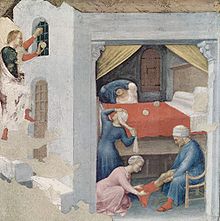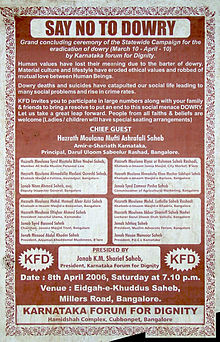- Dowry
-
A dowry (also known as trousseau or tocher or, in Latin, dos) is the money, goods, or estate that a woman brings forth to the marriage.[1][2] It contrasts with bride price, which is paid to the bride's parents, and dower, which is property settled on the bride herself by the groom at the time of marriage. The same culture may simultaneously practice both dowry and bride price. Dowry is an ancient custom, and its existence may well predate records of it.
Contents
Functions
One function dowry may be to provide the husband with "seed money" or property for the establishment of a new household and to help feed and protect the family. Another to provide the wife and children some support if he were to die. Still another function may be as compensation for bride price.[3]
A dowry may also have served as a form of protection for the wife against the possibility of ill treatment by her husband and his family.[4] In other words, the dowry provides an incentive to the husband not to harm his wife.
An evolutionary psychology explanation for dowry and bride price is that bride price is common in polygynous societies which have a relative scarcity of available women. In monogamous societies where women have little personal wealth dowry is instead common since there is a relative scarcity of wealthy men who can choose from many potential women when marrying.[5]
Code of Hammurabi
Even in the oldest available records, such as the Code of Hammurabi, the dowry is described as an already-existing custom. Regulations surrounding the custom include: the wife being entitled to her dowry at her husband's death as part of her dower, her dowry being inheritable only by her own children, not by her husband's children by other women, and a woman not being entitled to a (subsequent) inheritance if her father had provided her dowry in marriage. If a woman died without sons, her husband had to refund the dowry but could deduct the value of the bride price; the dowry would normally have been the larger of the sums.[6]
In Europe
Dowry was widely practiced in Europe. In Homeric times, the usual Greek practice was to give a brideprice. Dowries were exchanged in the later classical time (5th century BC). Ancient Romans also practiced dowry, though Tacitus notes that the Germanic tribes practiced the reverse custom of the dower.
A husband had certain property rights in his wife's dowry. In addition, the wife might bring to the marriage property of her own, which was not included in the dowry and which was, as a result, hers alone. This property was "beyond the dowry" (Greek: parapherna, the root of paraphernalia) and was known as paraphernal property or extra-dotal property.
Failure to provide a customary, or agreed-upon, dowry could cause a marriage to be called off. William Shakespeare made use of such an event in King Lear: one of Cordelia's suitors gives up his suit upon hearing that King Lear will give her no dowry. In Measure for Measure, Claudio and Juliet's premarital sex was brought about by their families' wrangling over dowry after the betrothal. Angelo's motive for forswearing his betrothal with Mariana was the loss of her dowry at sea.
Folklorists often interpret the fairy tale Cinderella as the competition between the stepmother and the stepdaughter for resources, which may include the need to provide a dowry. Gioachino Rossini's opera La Cenerentola makes this economic basis explicit: Don Magnifico wishes to make his own daughters' dowry larger, to attract a grander match, which is impossible if he must provide a third dowry.[7]
One common penalty for the kidnapping and rape of an unmarried woman was that the abductor or rapist had to provide the woman's dowry. Until the late 20th century this was sometimes called wreath money, or the breach of promise. (See raptio and bride kidnapping.)
Providing dowries for poor women was regarded as a form of charity by wealthier parishioners. The custom of Christmas stockings springs from a legend of St. Nicholas, in which he threw gold in the stockings of three poor sisters, thus providing for their dowries. St. Elizabeth of Portugal and St. Martin de Porres were particularly noted for providing such dowries, and the Archconfraternity of the Annunciation, a Roman charity dedicated to providing dowries, received the entire estate of Pope Urban VII. As the French crown provided dowries for many of the women persuaded to travel to New France for marriages and settlement there, they were known as filles du roi (daughters of the king).
In some parts of Europe, especially Eastern Europe, land dowries were common. In the County of Bentheim, for instance, parents who had no sons might give a land dowry to their new son-in-law. It was commonly given with the condition that he take the surname of his bride, in order to continue the family name.
The Domostroy, a Russian advice book of the sixteenth century for upper classes, includes advice to set aside property for purposes of a dowry, and use it accumulate linens, clothings, and other things for it, rather than have to suddenly buy it all for the wedding; if the daughter should happen to die, the dowry should be used to give alms and for prayers for her soul, although some might be set aside for other daughters.[8] In late Tsarist Russia the dowry originally consisted of clothing for the bride, linen, and bedding.[9] Linen became less common, a fact blamed on poor flax harvest and girls being poor spinners, but emphasis was added to the finest of the clothing, and a money dowry was sometimes added, particularly if the bride was regarded as having some fault.[10] Prospective in-laws, usually concerned mostly with her working ability, grew more concerned about a money dowry.[11]
The Portuguese crown gave two cities as dowry to the British Crown in 1661 when King Charles II of England, Scotland and Ireland married Catherine of Braganza, a princess of Portugal. They were Mumbai (Bombay) in India and Tangier in Morocco.
In Victorian England, dowries were seen among the upper class as an early payment of the daughter's inheritance. Only daughters who had not received their dowries were entitled to part of the estate when their parents died. If a couple died without children, the woman's dowry was returned to her family.[12]
In some cases, nuns were required to bring a dowry when joining a convent.[13] At some times, such as ancien regime France, convents were also used by some parents to put less attractive daughters, so that the more marriagable daughters could have larger dowries.[14] Ancien regime families that could not provide proper dowries also used the convents as places to put their daughters.[15]
In Asia
Dowry is a common practice in many Asian countries, including Bangladesh, India, Pakistan, and Sri Lanka.
Dowry system in India
Main article: Dowry system in IndiaAs Child marriages (both bride and groom are young) were prevalent in India, the brides parents offer dowry to the grooms family in the form of money and materials. This is in order to help support the livelihood of the bride until groom grows up to support her himself. The opposite of this is called Kanyashulkam.
In India dowry (known as Dahej in Hindi)[16] is the payment in cash or some kind of gifts given to bridegroom's family along with the bride. Generally they include cash, jewellery,[17] electrical appliances, furniture, bedding, crockery, utensils and other household items that help the newly-wed set up her home.
In India the dowry system has been putting great financial burden[18] on the daughters family. It has been one of the reasons for families and women in India resorting to sex selection [19] favoring to have a son.[20] This has distorted the sex ratio in India (933 females per thousand males [21]) and has given rise to female foeticide.[22]
The payment of a dowry has been prohibited under The 1961 Dowry Prohibition Act in Indian civil law and subsequently by Sections 304B and 498a of the Indian Penal Code (IPC). Despite the anti-dowry law in India, it is still widely and illegally practiced across the country.[23]
See also
References
- ^ The KenyaSomali Consortium, WHERE GOLD MAKES OR BREAKS MARRIAGES, May 21, 2007
- ^ Dowry – Definition from the Merriam-Webster Online Dictionary
- ^ Dowry - Reference.com, from The Columbia Electronic Encyclopedia, 2004
- ^ Nigel Guy Wilson. "Dowry". Encyclopedia of Ancient Greece. 2002.
- ^ The Oxford Handbook of Evolutionary Psychology, Edited by Robin Dunbar and Louise Barret, Oxford University Press, 2007, Chapter 26 The evolutionary ecology of family size.
- ^ Thompson, James C., B.A., M.Ed., Women in the Ancient World: Women in Babylonia Under the Hammurabi Law Code
- ^ Marina Warner, From the Beast to the Blonde: On Fairy Tales And Their Tellers, pp. 213–4 ISBN 0-374-15901-7
- ^ Carolyn Johnston Pouncey, The Domostroi: Rules for Russian Households in the Time of Ivan the Terrible, p95 ISBN 0-8014-9689-6
- ^ Olga Semyonova Tian-Shanskaia, Village Life in Late Tsarist Russia, p3 1993, Indiana University Press, Bloomington and Indianopolis
- ^ Olga Semyonova Tian-Shanskaia, Village Life in Late Tsarist Russia, p3-4 1993, Indiana University Press, Bloomington and Indianopolis
- ^ Olga Semyonova Tian-Shanskaia, Village Life in Late Tsarist Russia, p66 1993, Indiana University Press, Bloomington and Indianopolis
- ^ Gail MacColl and Carol McD. Wallace, To Marry An English Lord, pp. 166–7, ISBN 0-89480-939-3
- ^ "Convent", Catholic Encyclopedia
- ^ Louis Auchincloss, False Dawn, p 42 ISBN 0-385-18021-7
- ^ Louis Auchincloss, False Dawn, p 48 ISBN 0-385-18021-7
- ^ http://www.moneycontrol.com/news/business/godrej-%E2%80%98nupur-jagruti%E2%80%99dahej-ke-khilaf-ek-awaz_270666.html
- ^ "Dowry death: Police recovers Payal’s items". Tribune. http://www.tribuneindia.com/2011/20110205/cth2.htm.
- ^ . May 17, 2011. http://www.nationalrighttolifenews.org/news/2011/05/indian-man-accused-of-killing-wife-who-refused-to-abort-third-daughter/.
- ^ http://timesofindia.indiatimes.com/india/Govt-looks-to-tighten-abortion-norms/articleshow/8454657.cms
- ^ http://twocircles.net/2011may04/son_preference_attitude_among_indian_parents_silent_emergency.html
- ^ http://censusindia.gov.in/Census_Data_2001/India_at_glance/fsex.aspx
- ^ AFP. http://www.google.com/hostednews/afp/article/ALeqM5icE4hXn5sk-QkPYRXAeFXXB-mPWA?docId=CNG.477403fb22cbf6f9627f77ef6427bad2.4c1.
- ^ "A satire on weddings, dowry and 'match-making aunties'". http://www.sify.com/news/a-satire-on-weddings-dowry-and-match-making-aunties-news-national-lfsvPBbghai.html.
Further reading
- Hirsch, Jennifer S., Wardlow, Holly, Modern loves: the Anthropology of Romantic Courtship & Companionate Marriage, Macmillan, 2006. ISBN 0472099590. Cf. Chapter 1 "Love and Jewelry", on contrasting a dowry and a bride price.
Wikimedia Foundation. 2010.


